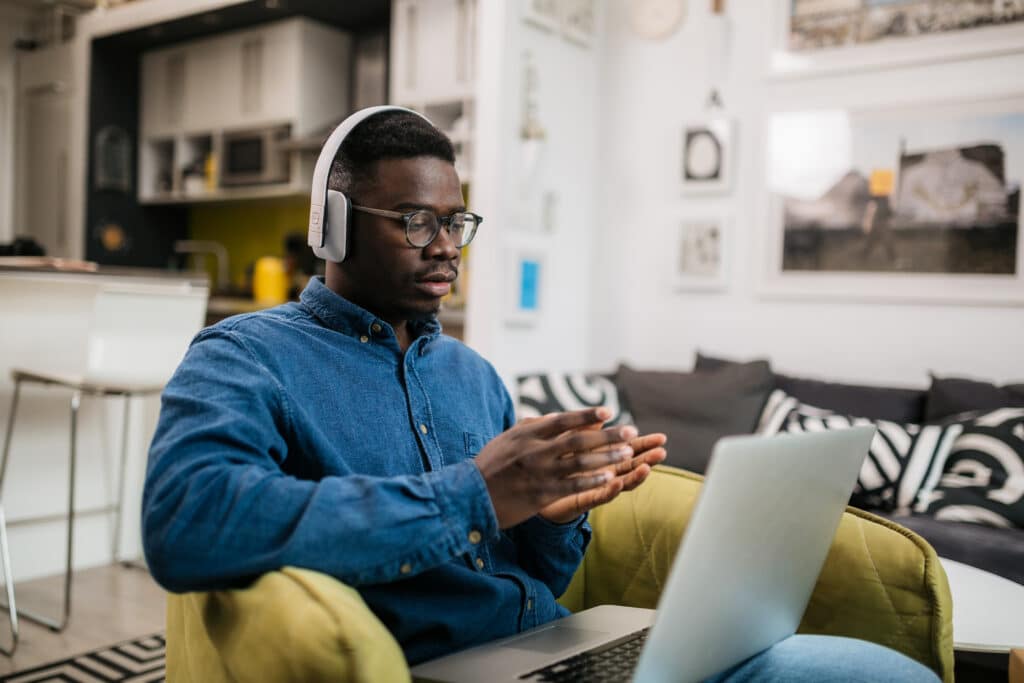What we learnt about burnout with Elke Geraerts

In 2019, burnout was recognised by the World Health Organisation (WHO) as an occupational phenomenon. But what is burnout? This, and what changes we can make in our lives in order to build our mental resilience were the focus of our most recent webinar. We were joined by renowned psychologist and author Elke Geraerts, straight from her virtual brain studio.
Watch our webinar below
The role of the pandemic
There have been hundreds of surveys and reports over the last couple of years looking at how widespread burnout actually is. Most have concluded that over half of employees have experienced symptoms of burnout. And the poll we ran to our audience backed up this fact, with 56% saying they have experienced symptoms. What is perhaps more surprising was our poll also showed that 34% of our audience were not sure if they had ever experienced burnout.
What is burnout?
According to the WHO: Burnout is a syndrome conceptualized as resulting from chronic workplace stress that has not been successfully managed. It is characterized by three dimensions:
- feelings of energy depletion or exhaustion;
- increased mental distance from one’s job, or feelings of negativism or cynicism related to one’s job; and
- reduced professional efficacy.
Before the pandemic, all of us were already experiencing signs of stress and burnout as a result of the world we live in. Our daily lives are full of pressure and we are overloaded with information everywhere we turn. The digital transformation had already started to take off before the pandemic, and the last two years have brought this front and centre for more people than ever.
The pandemic acted as a reset, and people everywhere realised what is important to them. These are the things that people want to hold onto as life gets back to normal.
What can you do to hold on to the positives gained over the last two years and use this to build your own mental resilience, and ultimately help avoid burnout?
Build awareness
When you are awake your mind is always wandering. Actually 47% of the time. This is when the primitive brain is taking over and helps breed negativity. Mind wandering stops the frontal cortex of our brains from working and as the primitive brain becomes more active, more stress hormones and cortisones are produced. These are bad for your body over a long period of time and all contribute to the building of stress.
The first step to reducing symptoms of burnout comes from creating a more positive mindset, and you can do this by building awareness and knowing better about what is going on in your brain. The faster you can combat the primitive brain and subdue it, the faster you can stamp out burnout symptoms. One way to do this is when you find your mind wandering, ask yourself, “What am I thinking”? Chances are it will be negative thoughts, so try to change these into positives. Make this a new habit to ask yourself this during quiet moments or moments of boredom.
Get more focussed
Everyone knows life is busy, and we all try to multitask. But really, when you multitask 80% of your attention goes nowhere. Ultimately nothing gets done. The primitive brain like distractions and new things/new stimulations all the time, and the more you try to work on multiple tasks at once, the more dopamine is released into your brain. Over time, you get addicted to dopamine.
To counter a dopamine addiction:
- Try 1hr tasking: Focus on one task for one hour. This will allow you to become more in the flow and ultimately get more done. Helping your brain function with less dopamine!
- Develop an attention ritual: By developing something that you can do every time you want to get into the flow for a certain task, you can train your mind to focus more quickly After consistently doing this same ritual your brain will automatically focus every time you do it. If you try this for about four weeks, you should start to see the difference in your concentration.
Research has suggested that those that are more focused and experience flow, are happier and are less likely to develop certain cancers. Making for a more healthy life all around. Being able to focus faster and for longer helps to keep symptoms of burnout at bay. You will feel more in control of your workload.
“When you are hunting elephants, don’t get distracted chasing rabbits.”
Building a culture where everyone can focus on their elephants is key to creating a space where everyone can help combat burnout. Every employee has their “rabbits” to tackle. The same tasks are individually small and continuous, like managing emails. Instinctively, you will always want to work on the easy wins and the quick tasks during your work day. But really, you should prioritise the big tasks that take a lot more thought and energy. Start with these projects at the beginning of the day, when you are refreshed and ready to go.
By encouraging a culture where everyone can have the space to easily say they are working on their elephant, their large, top priority tasks, will allow for greater team success and a happier working environment.
Invest in absent time
Everyone should take time away from screens. The shift to home working models has meant, on the whole, we all spend less time away from our screens, giving our minds less time to recuperate. In the office, we naturally have more breaks; from our commute to time at the coffee machine, our days are broken up. This happens less at home. Therefore, in order to break up your days at home, you need to plan absent time. This can be a non-work related video call with colleagues or ten minutes reading a book or strolling outside.
What is your motivation?
Understanding why you do what you do is really important for your mental wellbeing. It is more than just understanding why you work; it is understanding why you are a lawyer, for example, why do you work in-house or in a law firm. This will give you energy.
Every day ask yourself these questions:
- What did I do today that I am satisfied with?
- What did someone else do for me that I liked?
- What did I see, hear, feel, smell, taste that I enjoyed?
Now is the time to build greater connections with colleagues and instead of a separation between work and home, now is the time to integrate. It takes so much energy to be different people in different settings, but being one person can bring a positive source of energy, and thus can be an antidote for burnout.


